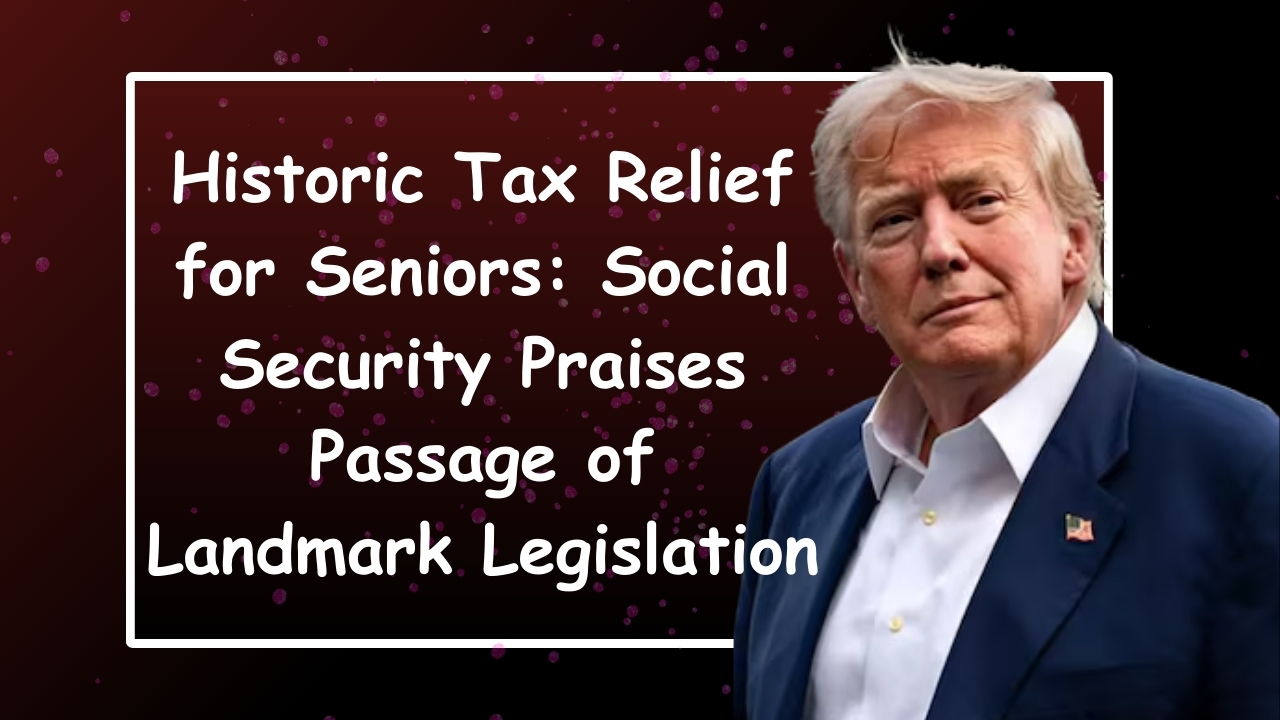The SSA is applauding the passage of the One Big, Beautiful Bill, considering a revolutionary part of legislation that brings anticipated relief from federal taxes to millions of senior Americans. This bill confirms says a tax break for seniors 65 and older will prevent nearly 90% of Social Security recipients from having to pay federal taxes on their income.

This offering provides instant tax relief to elders who have been contributing to our nation’s economy. This is a historic move made for America’s seniors, said Frank Bisignano, Commissioner of the Social Security Department. It has been 90 years now, and Social Security has ensured financial stability for older Americans.
And this initiative to reduce tax burden on benefits reaffirms the promise of President Trump to protect Social Security and support seniors so they can better enjoy their life after retirement, which they have earned. However, the experts say that these new laws are misleading.

Historic Tax Relief for Seniors: What is it?
The new amendments in policies contain a provision that removes federal income tax on benefits for most Social Security recipients, ensuring financial relief to individuals and couples. SSA does so by offering an enhanced deduction for taxpayers who reach the age of 65 or older, aiming that seniors after retirement can keep more of what they earned in their lifetime. The new senior deduction is $6,000 annually for persons aged 65 or older.
With this new legislation, Social Security remains committed to delivering accurate and timely information to the applicants and will consistently work closely with federal partners, ensuring beneficiaries understand how these new laws may affect them.

Social Security Historic Tax Relief for Seniors – Overview
| Article On | Historic Tax Relief for Seniors: Social Security Praises Passage of Landmark Legislation |
| Country | United States |
| Department | Social Security Administration |
| Program Name | Social Security Benefits |
| Bill Name | The One, Big, Beautiful, Bill Act (OBBBA) |
| Beneficiary | Eligible U.S. Retirees |
| Social Security Tax Cut | As per income threshold |
| Category | Finance |
| Official Website | ssa.gov |
What the $6,000 Deduction Promises
According to the White House, the bill’s $6,000 tax break for seniors 65 and older will prevent nearly 90% of Social Security recipients from having to pay federal taxes on their income.
- The tax relief is for those whose income did not exceed $75,000 (single filers) and $150,000 (joint filers).
- The tax deduction phases out entirely at $175,000 for singles and $250,000 for couples. In other words, although it brings down or wipes out taxes for millions of people, countless others won’t profit from the new tax deduction since they earn more than the threshold.

Impact of the Tax Cuts on Beneficiaries
The main headline of this announcement is the tax deduction for federal retirees. American seniors aged 65 years or more are now permitted to claim a maximum of $6000 on their taxable earnings. While couples filing jointly can now claim up to $12000. Thus, the new taxation of social security will extend from 2025 to 2028.
The major objective of the SSA in providing tax deductions on the overall income of retirees is to ease their tax burden with low retirement incomes. Yet, there is one thing that retirees must be aware of is that their social security benefits are not totally exempt from being taxed, and it is just a tax deduction that lowers their total taxable income.

Why is this Legislation Controversial?
On July 3, 2025, the SSA blasted out an email with the subject line: Social Security Applauds Passage of Legislation Providing Historic Tax Relief for Seniors.
The department is not usually sending governmental emails, so this one is remarkable. But that is not the main issue, said Howard Gleckman, who is a senior fellow at the Urban-Brookings Tax Policy Center.
Critics argue that the email is pretty misleading. It contains a number of assertions that are fully true and overstated in a way that may confuse people.
First, the mail stated that the OBBBA bill changes how the benefits are taxed from now, and the White House passed a headline, “No Tax on Social Security is A Reality in the One Big Beautiful Bill”.
But in reality, social security benefits are taxed like normal income, and this law does not bring any changes.
Second, the mail says a tax break for seniors 65 and older will prevent nearly 90% of Social Security recipients from having to pay federal taxes on their income.
Indeed, according to the estimate from the White House Council of Economic Advisers, 88% of Social Security recipients will not have to pay federal taxes on their income under the new law.
But Gleckman points out that, according to the administration’s estimate, almost two-thirds of the beneficiaries already do not pay any taxes on their benefits because they do not earn enough for those taxes to kick in.
After all these criticisms, SSA posted a news release with an improvement that eliminates the language stating that the $6,000 annual deduction for Social Security seniors is in addition to a separate policy variation.
Why Are Experts Worried?
Granting a short-term tax deduction will benefit some Social Security beneficiaries but will perhaps further weaken the retirement program’s precarious fiscal situation, said Kogan. Social Security analysts maintain that the timing of this legislation is a little questionable because it comes during a period when the Social Security Trust fund is under long-term financial strain.
The Trust fund is estimated to run out of money by 2034, and at that time, Social Security checks could be reduced by as much as 19% if Congress fails to address the funding shortfall. Thus, cutting back on taxes accrued on tax benefits, however temporarily, such as the instance of the new bill, undermines the fiscal base of the Trust Fund, bringing it closer to collapse.
Frequently Asked Questions
What does this legislation do?
It provides a tax break for seniors 65 and older will prevent nearly 90% of Social Security recipients from having to pay federal taxes on their income.
Who is eligible for the full $6,000 deduction?
Individuals with a modified adjusted gross income under $75,000 and couples under $150,000 are eligible to receive the full deduction.
Does it apply to all seniors?
It primarily benefits middle and upper-middle-class seniors paying tax on their benefits. Low-income retirees already enjoy tax exemptions.





